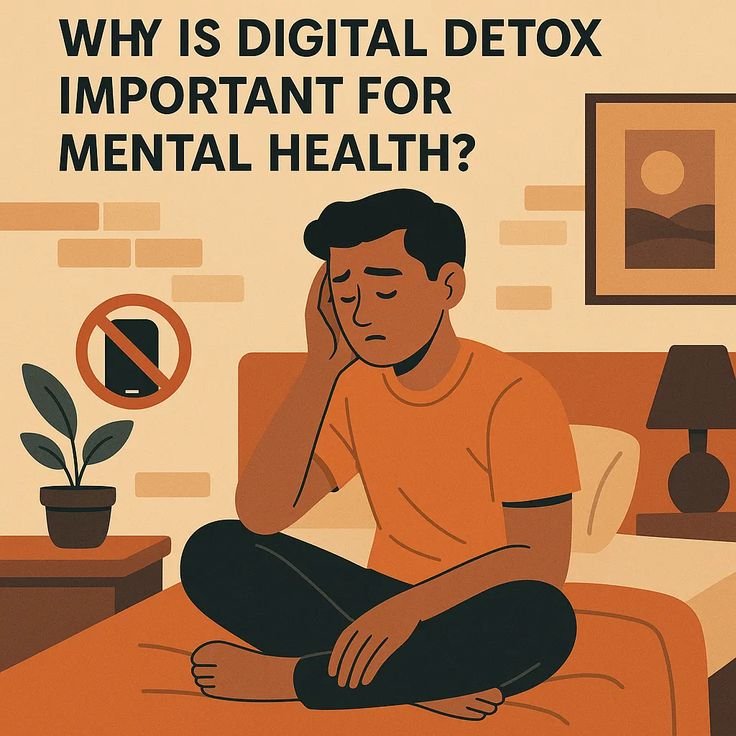Our increasingly digital lives make it harder than ever to unplug. With constant notifications, social media feeds, and endless emails, technology keeps us perpetually connected. However, the impact of this digital dependency on mental and physical health is well-documented. A digital detox—a conscious break from screens—can bring wide-ranging benefits backed by science. Here’s what you need to know about why you should consider a digital detox and how to get started.
What Is a Digital Detox?
A digital detox involves intentionally stepping away from digital devices like smartphones, laptops, tablets, and televisions. The goal is to reduce screen time, alleviate stress, and refocus on offline activities. While the length of a detox varies from person to person, the key lies in mindful disconnection, whether for a few hours, days, or longer.
The Science-Backed Benefits of a Digital Detox
1. Improved Mental Health
Studies consistently show that constant device use is linked to higher levels of stress, anxiety, and depression. Excessive screen use, particularly social media, often results in unhealthy comparisons, cyberbullying, and information overload. Research published in The American Journal of Health found that individuals who reduced screen time reported significant decreases in anxiety symptoms.
How a Detox Helps:
- Reduces exposure to negative online interactions.
- Encourages healthier boundaries with social media.
- Lets you focus on personal well-being without external pressure.
2. Better Sleep Quality
Blue light emitted by screens interferes with melatonin production, the hormone needed for quality sleep. A chronic lack of restorative sleep can lead to fatigue, irritability, and long-term health issues. Research from Harvard Medical School emphasizes that limiting screen use—especially before bedtime—can improve sleep efficiency.
Benefits of Reduced Screen Time:
- Promotes healthier circadian rhythms.
- Enhances deep sleep cycles.
- Improves overall mood and energy levels.
3. Enhanced Productivity
Although smartphones and tablets offer convenience, they can be a source of distraction. An abundance of alerts or endless scrolling on social media often leads to “productivity paralysis.” One study from the Journal of Behavioral Addictions found a direct connection between frequent smartphone use and lower task performance.
Positive Results of Unplugging:
- Helps focus fully on responsibilities and deadlines.
- Allows for more creativity and problem-solving.
- Reduces decision fatigue from juggling too much information.
4. Strengthened Relationships
Excessive device use often interferes with personal connections. Research conducted by Pew Research Center indicated that nearly 60% of adults believe smartphones are negatively affecting family time. A digital detox encourages face-to-face interactions, leading to deeper and more meaningful relationships.
Benefits for Social Well-Being:
- Creates opportunities for engaging in real conversations.
- Fosters a sense of presence and emotional availability.
- Reduces conflicts caused by “phubbing” (phone snubbing).
5. Physical Health Improvements
Spending too much time on screens contributes to a sedentary lifestyle, eye strain, and even posture-related problems like “tech neck.” A digital detox naturally encourages physical activity and healthier habits. According to the World Health Organization, regular breaks from screens can help alleviate these issues, promoting long-term well-being.
Physical Benefits Include:
- Reduced risk of digital eye strain.
- Improved posture and decreased back pain.
- Encouragement for outdoor activities, boosting overall fitness.
6. Better Cognitive Function
Studies reveal that frequent screen use affects attention spans and memory retention. Digital overload can impair focus, making it difficult to think clearly or retain information. A study published in Nature found that screen-free time enhances mental clarity and improves cognitive resilience.
Cognitive Gains:
- Ability to concentrate on complex tasks.
- Improved memory retention.
- A clearer, less cluttered mental space.
How to Start a Digital Detox
Taking the first step toward unplugging doesn’t have to be overwhelming. A gradual, structured approach allows you to ease into the process and adapt over time.
1. Identify Your Goals
Start by understanding why you want to detox. Are you looking to improve sleep, reduce stress, or spend more time with loved ones? Defining clear goals helps maintain focus and measure progress.
2. Set Realistic Boundaries
Cold-turkey approaches rarely work long term. Instead:
- Turn off non-essential notifications.
- Schedule periodic “screen-free” hours during the day.
- Avoid screen use at least one hour before bedtime.
3. Create a Tech-Free Zone
Designating specific areas as screen-free helps reinforce boundaries. For example:
- Make your bedroom a no-device zone for better sleep.
- Keep screens out of dining areas to encourage mindful eating and family time.
4. Engage in Offline Activities
Fill your newfound free time with meaningful offline pursuits. Ideas include:
- Journaling to reflect on your thoughts and emotions.
- Outdoor walks or exercise to boost endorphins.
- Starting a new hobby or rekindling an old passion.
5. Use Supportive Tools
Leveraging technology ironically can help manage screen time effectively. Apps like Freedom or ScreenTime track usage and set limits on digital activities.
6. Try a Weekend Challenge
Begin with a 24- to 48-hour digital detox over the weekend. Commit to reading books, enjoying nature, or connecting with those around you instead of checking emails or scrolling through social media.
7. Track Progress and Reflect
Documenting the changes you experience during your detox provides motivation to continue. Use a journal to reflect on:
- Improvements in concentration or mood.
- Enhanced connections with family or friends.
- A greater sense of balance and well-being.
Maintaining Long-Term Balance
While a short detox offers immediate benefits, maintaining a healthier relationship with technology is the ultimate goal. Scheduling routine detox periods—such as weekly screen-free evenings or seasonal challenges—helps establish long-term habits.
Pro Tips for Balance:
- Regularly evaluate your tech usage and make adjustments as needed.
- Commit to device-free activities daily, like meditating or enjoying a meal.
- Unplug for specific times, such as mornings or while on vacation, to reset.
Final Thoughts
The science-backed benefits of a digital detox are undeniable. From improved mental and physical health to strengthened relationships and better productivity, unplugging offers valuable, lasting rewards. By taking small, actionable steps toward breaking free of digital dependency, you can create a more balanced, fulfilling lifestyle that prioritizes wellness over constant connectivity. Start today and experience the transformational impact of stepping away from your screens.



